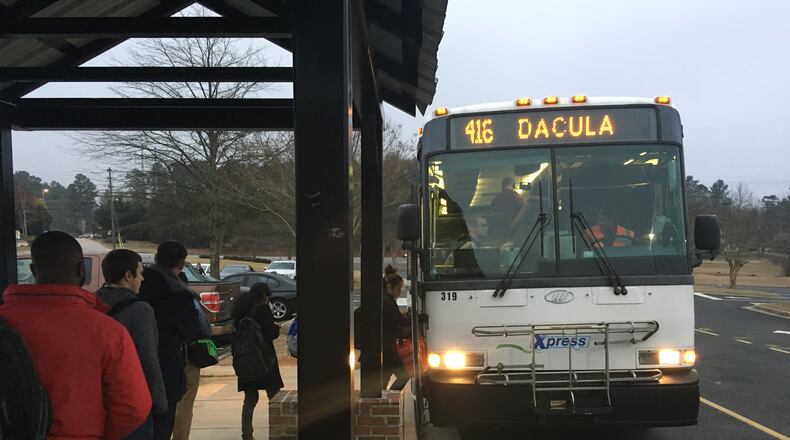After more than two years, Gwinnett County's new comprehensive transportation plan is finished, board-approved and ready to roll.
But what may be the plan’s most important creation — a spinoff study focusing specifically on the county’s transit-oriented future — is still several months away from completion.
Gwinnett began its transportation study in 2015 and used consultants, other officials and public input solicited at more than 60 events to create a sweeping 91-page document meant to guide the county's decisions through the next quarter-century or so. The plan, approved Tuesday by the county's Board of Commissioners, includes long lists of potential short-, medium- and long-term projects, including most, if not all, of those selected for the new special-purpose local option sales tax that Gwinnett voters approved in 2016.
Possible transportation-related projects range from helping widen I-85 between the DeKalb County line and Pleasant Hill Road to dozens of pedestrian improvements and new trails.
“It solves a lot of current problems,” Gwinnett Department of Transportation director Alan Chapman said, “but it also looks at future population growth and employment growth that will create additional travel demands in the county.”
The study also makes broader, more philosophical recommendations on how the county should make transportation-related decisions moving forward. Those suggestions include adopting “land use approaches supportive of [the] transportation network.”
"The recommendations that follow," the plan says, "emphasize the need for intensified development within the County's existing and future activity centers with access to transportation corridors. County policies and investments can create a connected transportation network that includes higher-capacity modes of transit and supports attractive, walkable and bikeable neighborhoods complete with homes, parks, civic spaces, and other amenities."
Gwinnett's transit offerings — and the expansion thereof — have been a hot topic this year. And they're likely to get even hotter in the coming months.
Early on in the transportation planning process, officials decided they'd need to undertake a separate study that focused more specifically on Gwinnett's transit future. That transit study officially launched over the summer and, Chapman said Tuesday, should be wrapped up in the first half of 2018.
“We’re putting together recommendations right now,” Chapman said.
Those recommendations are expected to include information about which types of transit expansion — anything from heavy or light rail to more local bus service — may be most financially feasible (and palatable) for residents.
Commission Chairman Charlotte Nash has said she wants residents to vote on some kind of transit expansion in Nov. 2018, and the findings of the county’s study are likely to have a significant impact on that potential referendum.
GWINNETT COMPREHENSIVE TRANSPORTATION PLAN
The scores of recommended projects listed in the plan include:
- Widening I-85 from Pleasant Hill Road to the DeKalb County line
- Upgrading several intersections on Sugarloaf Parkway
- Widening Peachtree Industrial Boulevard from Holcomb Bridge Road to I-285
- Widening Ga. 20 from Buford Highway to Peachtree Industrial Boulevard
- More than 50 sidewalk and pedestrian safety projects, including several on Jimmy Carter Boulevard
- Investigating "the development of a major transit hub"
- Encouraging the development of "complete streets," which provide access for drivers, bikers and walkers
MYAJC.COM: REAL JOURNALISM. REAL LOCAL IMPACT.
The AJC's Tyler Estep keeps you updated on the latest happenings in Gwinnett County government and politics. You'll find more on myAJC.com, including these stories:
Never miss a minute of what's happening in Gwinnett politics. Subscribe to myAJC.com.
In other Gwinnett news:
About the Author
Keep Reading
The Latest
Featured



